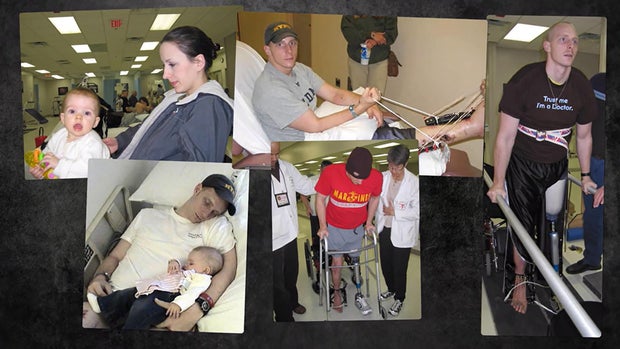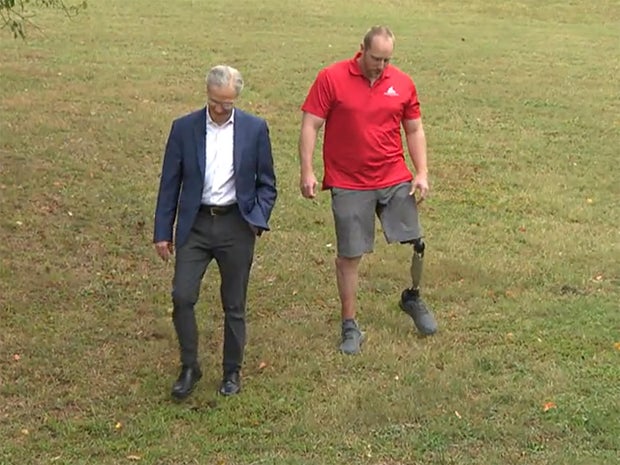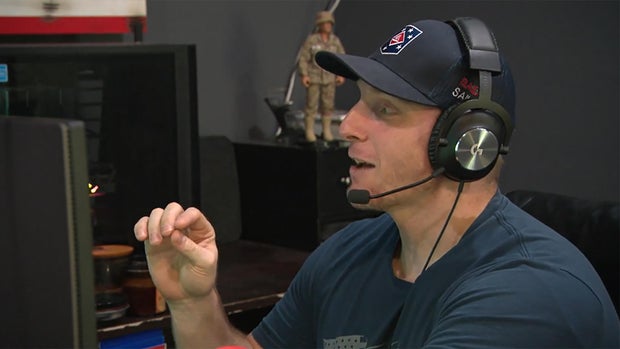We first met Joe Dan Worley 20 years ago, along with his mother, wife Angel and three-month-old daughter, at Walter Reed Hospital outside Washington.
Worley, a medic who helped wounded Marines in Iraq, was hit by a roadside bomb: his left leg was blown off and his right leg was riddled with bullets. “When I hit the ground, I was purely convinced that my whole body was just destroyed, I mean, that I was dead,” he said.
His mother said, “Our lives have just been turned upside down.”
It wasn’t just Worley’s serious wounds; the cost of moving to Washington to be with him had depleted the family’s savings. They didn’t even have enough for the baby’s winter clothes.
Then his mother said “an angel” walked in: “She just sat down and started talking to all of us, and just wrote a check and handed it to the kids.”
CBS News
That angel was sent by Karen Guenther, an ICU nurse at Camp Pendleton, California, as the wounded arrived. “I believe God just put me in the right place at the right time,” she said. “I was standing next to a young husband, and she was about 18 years old, and her husband, he was very disfigured, and she looked at him and her knees started to buckle. So I held her a little bit and whispered in her ear and I said, ‘You have this, you can do this.’ And just experiencing that changed everything.”
Guenther had experience dealing with traumatic injuries, but she said what was different in this case was that “this was so personal, and the number of injuries we saw coming back, the severity of the injuries coming back, was historically were.”
Many of them were returning from the all-out battle for the rebel stronghold of Fallujah. “We saw families come from all over the country to be at their son or daughter’s bedside,” Guenther said. “They left their jobs and left their homes, and yet they still had a car payment and a mortgage to make, and they just couldn’t do that. So that’s when we started the fund.”
She called it the Semper Fi & America’s Fund. “I knew nothing about starting a nonprofit, so I went to Barnes & Noble and bought every book I could about nonprofits,” she said. “’Nonprofits for Dummies’ was my very first book!”
The Battle of Fallujah lasted seven weeks. “It was overwhelming,” Guenther said. “At that time we didn’t have a lot of money in the bank, enough to cover the number of injured people who came back.”
Until the public met Joe Dan Worley, who narrated “60 Minutes” in 2004“I’m constantly worried about being able to provide for my family, you know, and wondering what the future will bring.”
Guenther said, “If that piece hadn’t happened, we wouldn’t have had the money to take care of the families.”
To date, the Semper Fi Fund has donated $500 million to 33,000 service members and their families – not just Marines, but across the military.
CBS News
In the beginning, the fund focused on responding at the bedside of the wounded. But the real work started when the soldiers went home. “If you come back and you’re paralyzed, or you’re a triple amputee, or even just a single amputee, there’s a life cycle of recovery,” Guenther said, “and these young men and women would need us for the rest. of their lives.”
Worley walked, but was still injured. His marriage to Angel was on the rocks. “It was a very difficult period,” he said.
“Something had to change or we wouldn’t make it,” Angel said.
Martin said: “That would have been a real shame.”
“Yes, it would be,” she replied. “I think what made us work is that we didn’t give up on each other at the same time.”
Worley added, “Not many marriages survive what we came through.”
He started exercising out of revenge, and their family continued to grow. Abby, who turned one while her father was still at Walter Reed, is now twenty. She has a sister and two brothers.
CBS News
Worley supplements his disability benefits by co-hosting a podcast for the American Legion. Yet a Semper Fi case worker comes by once a month. “For 20 years, they’ve always been there,” Angel said. “This way we know that if we really need something, we can ask for it.”
Martin asked, “Would you consider yourself happy today?”
“Yes, yes,” Engel replied. “I always tell people, if you can get through the hard times, what’s on the other side is so much better. It’s so worth it. Life is so good. We are so blessed.”
But, Guenther said, not all their stories are success stories: “Our warriors are proud, strong and brave, but sometimes they wear a mask and don’t let others see the pain they go through, or the brain damage from blasts and concussions.”
Do they know people who have lost their marriages? “We do, especially our catastrophic injuries,” she said. “Often, immediately after the injury, the families’ adrenaline goes… I can do this, I stay by my husband or wife’s side – but as the years go by, things can get really tough on marriages.”
The Worley family lives on the outskirts of Atlanta and is wealthy in the things that matter, with a pet pig. But Joe Dan will never be free of Fallujah. For the twentieth anniversary of the battle, he turns to music and records a song: ‘The Ballad of JoeDan’.
“This is my song, for my boys who were killed while I was there,” he said. “I carry these people in my heart, not on my back, but in my heart.”
“The Ballad of JoeDan” is full of sadness, but the life he built is full of purpose. “The body probably could have done without a traumatic amputation, but I really love what I’ve grown into,” he said.
For more information:
Story produced by Mary Walsh. Editor: Mike Levine.











